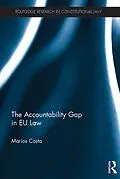The book explores whether the EU is an accountable international organization and investigates whether any progress towards accountability and transparency has been made in the post-Lisbon era. It takes a holistic approach to the subject reviewing the overall decision-making process of the EU. Marios Costa argues that currently the main EU institutions and main delegators along with the Member States are not in a position to control the actions or omissions of the so called independent EU agencies, committees and bodies and that despite recent progress the EU needs to put forward an acceptable constitutional framework to ensure the accountability of these independent bodies.
Autorentext
Marios Costa is a senior lecturer at City University London, UK.
Zusammenfassung
Almost two decades ago, the fall of the Santer Commission against a background of allegations of maladministration and nepotism had the effect of placing accountability on the political agenda of the EU institutions. More recently, the non-ratification of the Constitutional Treaty, the difficulties of the ratification of the Lisbon Treaty and the current financial crisis have increased the calls for accountability in the EU.This book investigates whether any progress towards more accountability and transparency has been made in the post-Lisbon era by taking a holistic approach to the subject. Marios Costa argues that currently the EU institutions and the Member States are not in a position to hold the so-called independent agencies as well as the various committees and expert groups accountable. Despite recent progress, the EU still needs to put forward an acceptable constitutional framework which will truly secure accountability at the EU level of governance.
Inhalt
1. Introduction 2. Centralized accountability and transparency 3. Accountability and EU Agencies 4. Accountability of the various EU committees and expert groups 5. Legal accountability and the role of the EU courts 6. Conclusion
